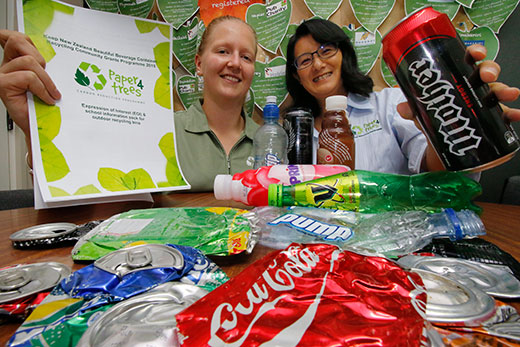An award-winning Tauranga environmental trust is spending more than $48,000 on secondary schools that prove they're keen to recycle cans and bottles – hopefully in the Western Bay of Plenty.
Environmental Education for Resource Sustainability Trust (EERST) has launched a national contest that offers high schools a set of recycling bins designed to keep beverage containers out of landfills.
EERST program manager Hope Lawsen and administrator Satsuki Takeuouchi helping secondary schools improve recycling rates. Photo: Bruce Barnard.
The competition springs from a pilot project that last year awarded the $4000 purpose-built, stainless steel bins to five colleges around New Zealand.
'The response from that project was so fantastic, we've obtained funding to deliver something much bigger,” says EERST chairman Marty Hoffart.
'Naturally, I'd love to see some strong applications from this area. We have several high schools in the Western Bay of Plenty and it would be great to see a local school get some of this funding to help clean up their school.”
'Depending on the quality of applications, we expect to put these bins into up to 12 secondary schools this year.”
Project funding comes from a Coca-Cola Foundation grant. Each winning school will receive $4000 to cover capital costs of two permanent outdoor recycling bins.
Marty says the contest aims to prevent aluminium, glass and plastic bottles being thrown out with general school waste. Secondary schools are the focus as they typically have low recycling rates for drink containers.
He says high school students generally have more money to spend on drinks and better access to shops than younger children.
'Increasing recycling rates in our high schools is part of a much bigger picture,” explains Marty.
'Before long, these students are going to be out there in the community and we all need them to be smart about minimising waste and reusing resources.
'There is an educational aspect to this project as well. As more students, teachers and visitors view recycling as a normal behaviour, we believe there are wider educational benefits to having these bins located at schools.”
But in order to be the lucky recipients, secondary schools will have to prove students and staff are motivated and organised enough to make good use of the bins.
The schools must submit a detailed plan following consultation with its caretaker, enviro group and principal outlining where the bins will be installed and how they will be maintained.
Each set comes with a 10-year warranty and the prize includes sign writing and delivery.
He adds: 'Don't just fill out the application form and say ‘we want one of these' and then it turns up at the school and nobody knows anything about it.”
Marty says a number of schools have applied already applied, but there is room for more – particularly from the Western Bay.
EERST already delivers the successful Paper4trees recycling programme to more than 4000 New Zealand schools. This programme is focussed on paper and cardboard recycling and deals with early childhood and primary, all the way up to high schools.
Formed in 2000, EERST is a community-based, not-for-profit organisation and a member of the Community Recycling Network and the Sustainable Business Network in New Zealand.
The trust aims to work with preschools, schools, businesses and communities to create a more sustainable future.
Applications for the recycling funding close on May 22 at 4pm. The winning schools will be announced on May 29.
For more information contact EERST administrator Satsuki Takenouchi on: 07 578 7025 or via: satsuki@eerst.co.nz



0 comments
Leave a Comment
You must be logged in to make a comment.